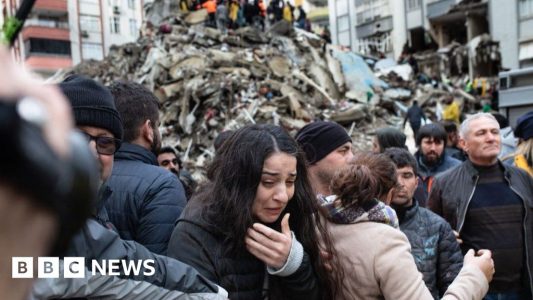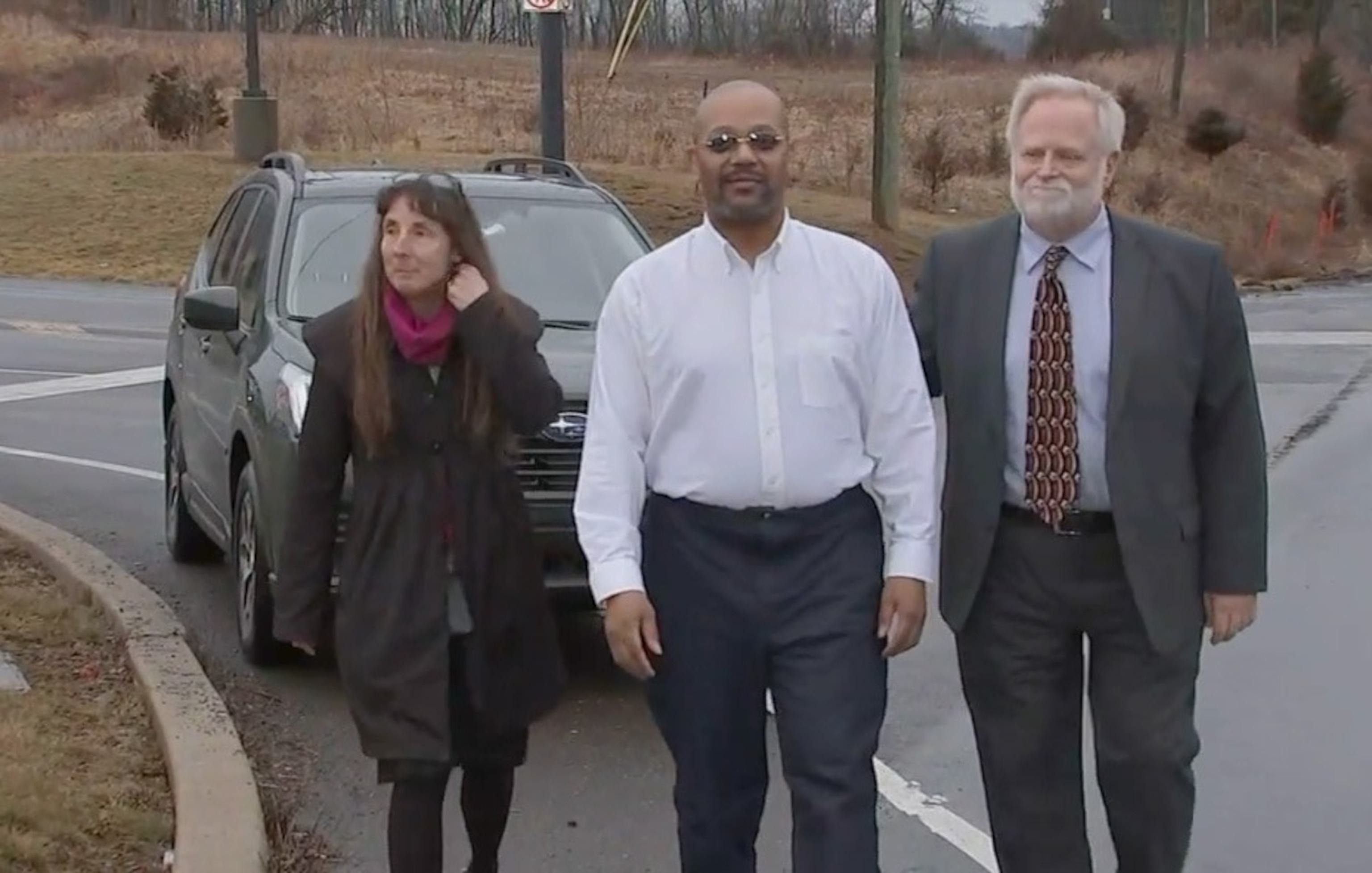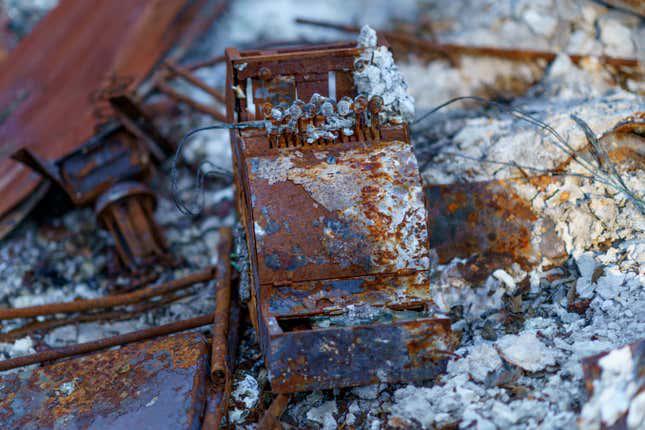Turkey/Syria: Earthquake death toll could soar eight-fold - Dispatch Weekly
February 7, 2023 - Reading time: 6 minutes

The World Health Organization has warned that the death toll from a powerful earthquake in southeast Turkey, close to the Syrian border, might increase eight-fold.
The death toll, which now exceeds 3,400, has rapidly risen since the first earthquake struck early on Monday morning.
A second significant earthquake struck further north around 12 hours later.
In the frigid and icy weather, rescuers have been searching through piles of wreckage for survivors.
International nations are sending equipment, sniffer dogs, and specialised crews to assist in the rescue operations.
According to the US Geological Survey, the 7.8 magnitude earthquake occurred in the city of Gaziantep at 04:17 local time (01:17 GMT) with a depth of 17.9 kilometres (11 miles).
The initial earthquake was one of the biggest ever recorded in Turkey, according to seismologists. The survivors reported that the shaking didn’t cease for two minutes.
The epicentre of the second earthquake, which had a magnitude of 7.5, was in the Kahramanmaras province’s Elbistan district.
It was not an aftershock, according to a representative of Turkey’s Disaster and Emergency Management Authority, even if many of them are still being felt locally.
Over 1,760 people have perished in Turkey, while 1,000 deaths in Syria have been officially acknowledged.
The WHO has issued a warning that as additional victims are discovered in the rubble, those numbers might rise by as much as eight times.
The senior emergency officer for Europe at the WHO, Catherine Smallwood, told AFP: “We always see the same phenomenon with earthquakes, which is that the first reports of the numbers of people who have died or who have been injured will climb pretty considerably in the week that follows.”
The dangers will be increased, Ms. Smallwood continued, because many people won’t have access to shelter due to the snowy weather.
There have been many thousands of injuries, including at least 9,700 in Turkey and 2,000 in Syria. These figures have likewise been climbing rapidly.
Millions of refugees reside in camps on both sides of the Syrian border with Turkey, where many of the victims are in the war-torn northern region of the country. Numerous fatalities have been reported in regions controlled by the rebels.
Numerous films document the moment that thousands of buildings in both countries crumbled as witnesses fled for cover. There are vast heaps of rubble as far as the eye can view, and several structures that were as tall as 12 stories have been demolished.
Gaziantep Castle, a more than 2,000-year-old historical site, was one of the structures that was demolished.
Anna Foster, a Middle East journalist, recounted a tragic scene while reporting from the Turkish city of Osmaniye, which was close to the epicentre.
“The rescue efforts are being hampered by the torrential rain and the complete lack of power in the city this evening.
“We continue to experience typical aftershocks. Additionally, there are still worries that other buildings could fall “added our correspondent.
Videos depicting enormous fires in southern Turkey have surfaced, and social media users have alleged that the fires were brought on by damage to gas pipelines. Turkey’s energy infrastructure has also been compromised.
Fatih Donmez, Turkey’s energy minister, acknowledged that the infrastructure had suffered significant harm but made no mention of the explosions.
Turkey is located in one of the seismically active regions of the planet.
The worst earthquake tragedy in the nation’s history occurred in 1939, when 33,000 people perished in the eastern province of Erzincan in Turkey. In 1999, a catastrophic quake killed more than 17,000 people in the north-west.
Melisa Salman, a resident of Kahramanmaras, claimed that although she was accustomed to “being rattled” due to her location in an earthquake zone, Monday’s tremor was “the first time we have ever experienced anything like that.”
We believed it to be the end of the world, she continued.
The Turkish Red Crescent has encouraged people to donate blood, and its president, Kerem Knak, said on Twitter that more blood and medical supplies were being rushed to the devastated area.
Turkish President Erdogan reported that 45 countries have given assistance after an international plea for support.
Many of the disaster-affected families, according to UN Secretary General António Guterres, “are already in grave need of humanitarian relief in locations where access is a difficulty,” prompting the appeal for an international response to the catastrophe.
The UK has indicated it will deploy 76 specialists, equipment, and rescue dogs to Turkey. The European Union is sending search and rescue teams there. Rescuers from the Netherlands and Romania have already left.
Vladimir Putin, the president of Russia, has offered assistance to Iran, France, Germany, Israel, the US, and both Turkey and Syria.
Suleymon Soylu, Turkey’s interior minister, claimed that the original earthquake had a negative impact on ten cities, including Hatay, Osmaniye, Adiyaman, Malatya, Sanliurfa, Adana, Diyarbakir, and Kilis.
In those cities, classes have been out for at least a week.
As he narrated the destruction in Sarmada, close to the Turkish border, a volunteer with the White Helmets rescue organisation, which operates in rebel-controlled regions of northwestern Syria, fought back tears.
He claimed that “several structures in various cities and villages in north-western Syria collapsed.”
“Numerous families are still buried in the debris. We are working extremely hard to save them, but it is a really difficult assignment.
“Northwestern Syria is now a disaster area,” he continued. “We need help. We need the international world to do something, to help us, to support us.
The earthquake was strong enough to be felt in Israel, Cyprus, and Lebanon.

DW Staff
David Lintott is the Editor-in-Chief, leading our team of talented freelance journalists. He specializes in covering culture, sport, and society. Originally from the decaying seaside town of Eastbourne, he attributes his insightful world-weariness to his roots in this unique setting.




